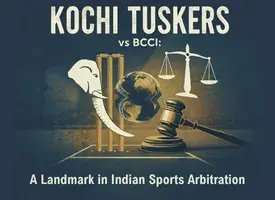By Nihit Nagpal and Avik Gopal
The Indian Premier League (IPL) is a multi-billion-dollar enterprise governed by intricate franchise agreements. One of the most significant legal battles in Indian sports law emerged from the abrupt termination of the Kochi Tuskers Kerala franchise by the Board of Control for Cricket in India (BCCI) in 2011.
Rendezvous Sports World Pvt Ltd (RSW), won the bid for the Kochi franchise, failed to furnish a bank guarantee by the stipulated deadline. Despite repeated extensions and ongoing engagement from BCCI, the franchise agreement was terminated. The matter escalated to arbitration, where the tribunal ruled in favor of Kochi Tuskers, awarding over ₹538 crore in damages and interest.
This case, later upheld by the Bombay High Court, has become a landmark in defining the boundaries of contractual enforcement, waiver by conduct, and the autonomy of arbitral awards in India’s sports governance landscape.
Factual Background
In 2008, BCCI issued invitation to tender the eight franchises which would make the Indian Premier League. Later, BCCI issued an invitation to tender to invite bids for two more franchises. Rendezvous Sports World Pvt Ltd (RSW) won the bid for the Kochi franchise and entered into a Franchise agreement with BCCI on April 11, 2010. It was agreed that a new company would be formed to take over the rights and obligation of the franchise. RSW furnished a bank guarantee in the sum of Rs. 153.34 crores as contemplated by invitation to tender. Kochi Cricket Private Limited was incorporated and a fresh agreement was executed between BCCI and KCPL where KCPL was required to provide an annual bank guarantee as security for payment obligations. The Specific requirement was to submit a bank guarantee by March 22, 2011.
Meanwhile, BCCI informed the franchises about the changes in format for 2011 edition of IPL where the number of matched to be played in the season was reduced. KCPL requested BCCI multiple times for the reduction in the Franchise fees. KCPL failed to submit the Bank Guarantee by the due date. They repeatedly requested extensions and provided justifications like pending internal issues, the new stadium agreement not yet finalized etc. BCCI issued multiple reminders to KCPL from March 2011 to September 2011, however KCPL asked for extension and said they would submit the bank guarantee as soon as possible. KCPL addressed BCCI stating that they would submit the requisite bank guarantee by September 21, 2011. Though, BCCI through a letter dated 17th September 2011, warned KCPL/RSW as the last opportunity to submit bank guarantee on the same day.
BCCI on 19th of September 2011, terminated the KCPL and RSW agreement providing the reason of failure to deliver the requisite bank guarantee on or before 22nd March 2011 and violation of essential contractual obligation. Believing that termination of the KCPL agreement by BCCI was wrongful, they invoked arbitration under dispute clause of the KCPL agreement. KCPL argued that despite the non-compliance, BCCI continued to engage with KCPL such as conducting meetings, entertained discussions, allowed KCPL to participate in the IPL 2011 etc. so, given the conduct of BCCI, it indicated that BCCI was not strictly enforcing the deadline and it amount to waiver of the strict deadline.
In the arbitration, it was found that BCCI’s conduct waived the strict compliance with the deadline. BCCI’s action to terminate the franchise was held to be wrongful and in breach of contract. The Tribunal awarded 384 crore to KCPL towards loss and damages and 153.34 crore to RSW for wrongful encashment of the bank guarantee. 18% interest were also awarded bringing the total amount to be 538 crore.
Bombay High Court Judgment
Following the pronouncement of the tribunal awards, the BCCI deeply dissatisfied, challenged these awards before the Hon’ble Bombay High court under section 34 of Arbitration and Conciliation Act. The BCCI argued that the arbitrator misunderstood the agreement clauses related to bank guarantee and termination provision. They have overlooked important contractual deadlines. Furthermore, they argued that the damages awarded were excessive in nature.
Justice Riyaz Chagla, presiding over the single-judge bench, delivered the judgment. The court re-affirmed the limited and circumscribed role of courts in reviewing arbitral awards under section 34 of Arbitration and Conciliation Act. Court clarified that mere “dissatisfaction with arbitrator’s findings” is not a valid ground for setting aside an arbitral award. The court examined BCCI’s contention regarding “Patent illegality” and found no fundamental flaws or serious error in arbitrator’s reasoning.
The court upheld the arbitral tribunal’s decision that the BCCI had indeed wrongfully invoked the bank guarantee and its conduct of continuous engagement and acceptance of various payment from Kochi Tusker’s even after the stipulated deadline, had effectively waived the strict requirement for furnishing the bank guarantee by March 2011. Ultimately, the Bombay High Court dismissed the petition filed by the BCCI, thereby upholding the entirety of the arbitral awards.
Implication of Judgment
The judgment reinforce the critical need for drafting exceptionally clear, transparent and stringently enforceable franchise agreements within the realm of sports governance. It highlights that ambiguous clauses or inconsistent conduct can lead governing bodies to substantial financial liabilities. This decision significantly strengthens confidence in arbitration as final and binding dispute resolution mechanism in India. It is clear signal to both domestic and international entities that Indian courts are increasingly upholding arbitral autonomy, thereby promoting stability and fostering a more arbitration friendly environment. It strengthens the principle that courts should not interfere with arbitral awards except in exceptional cases like patent illegality or procedural unfairness.
Niti Shreshtha, Former Intern at S.S.Rana & Co. has assisted in the research of this article.


